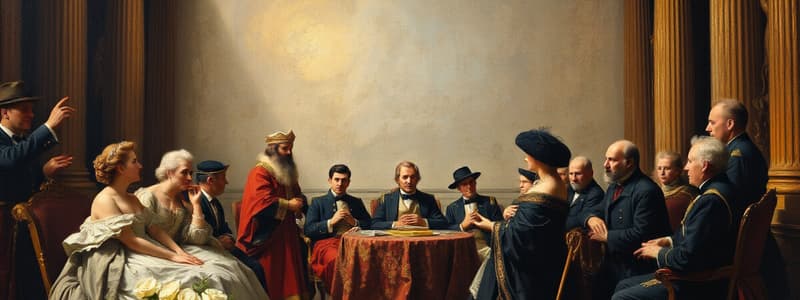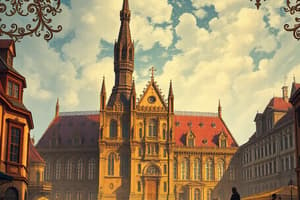Podcast
Questions and Answers
What is an absolute monarchy?
What is an absolute monarchy?
- A system where power is held by a small group
- Government where citizens vote on all issues
- Governed by a king or queen with supreme authority (correct)
- A system led by a dictator
Provide an example of an absolute monarchy.
Provide an example of an absolute monarchy.
Jordan
What defines a dictatorship?
What defines a dictatorship?
- Government based on religious principles
- Citizens participate in all decision-making
- One person or a small group holds unlimited power (correct)
- Power is distributed among regional governments
What is an example of a dictatorship?
What is an example of a dictatorship?
What does oligarchy mean?
What does oligarchy mean?
Provide an example of an oligarchy.
Provide an example of an oligarchy.
What characterizes totalitarian regimes?
What characterizes totalitarian regimes?
Give an example of a totalitarian regime.
Give an example of a totalitarian regime.
What is a key feature of a theocracy?
What is a key feature of a theocracy?
Provide an example of a theocracy.
Provide an example of a theocracy.
Define a direct democracy.
Define a direct democracy.
What is an example of where direct democracy works well?
What is an example of where direct democracy works well?
What is a constitutional monarchy?
What is a constitutional monarchy?
Give an example of a constitutional monarchy.
Give an example of a constitutional monarchy.
What is a republic?
What is a republic?
Provide an example of a republic.
Provide an example of a republic.
Define a unitary system.
Define a unitary system.
Provide an example of a unitary system.
Provide an example of a unitary system.
What is a federal system?
What is a federal system?
Provide an example of a federal system.
Provide an example of a federal system.
What is a confederal system?
What is a confederal system?
Provide an example of a confederal system.
Provide an example of a confederal system.
Describe a parliamentary system.
Describe a parliamentary system.
What is a disadvantage of a parliamentary system?
What is a disadvantage of a parliamentary system?
What is typical of a presidential system?
What is typical of a presidential system?
How do dictators tend to hold onto their power?
How do dictators tend to hold onto their power?
Why are representative democracies more common than direct democracies?
Why are representative democracies more common than direct democracies?
How are republics and democracies similar?
How are republics and democracies similar?
How do republics differ from democracies?
How do republics differ from democracies?
What were the duties of the Senate in the Roman Republic?
What were the duties of the Senate in the Roman Republic?
In what system of government do states and regions exercise the most power?
In what system of government do states and regions exercise the most power?
Describe the U.S. federal system.
Describe the U.S. federal system.
How is power organized in a unitary system?
How is power organized in a unitary system?
Flashcards are hidden until you start studying
Study Notes
Types of Government Systems
- Absolute Monarchy: Governed by one individual, typically a king or queen, with supreme authority. Example: Jordan.
- Dictatorship: Centralized power under one ruler or small group, often maintained through force. Example: Cuba.
- Oligarchy: Rule by a small, powerful group prioritizing their interests, typically based on wealth or military power. Example: Ancient Sparta.
- Totalitarian Regimes: Dictatorship with unlimited authority over political, social, and economic life, without restrictions. Example: North Korea.
- Theocracy: Government led by religious leaders asserting divine guidance. Laws are based on religious texts. Example: Iran.
- Direct Democracy: Decision-making is performed directly by citizens, typically in small communities. Example: Athens in Ancient Greece.
- Constitutional Monarchy: Monarch acts as head of state within limits set by an elected parliament. Example: United Kingdom.
- Republic/Representative Democracy: Indirect democracy where officials are elected to represent the people's interests. Example: United States and Ancient Rome.
Government Structures
- Unitary System: Authority centralized in one national government; local governments execute central decisions. Examples: United Kingdom, Japan.
- Federal System: Power divided among national, state, and regional governments, each with law-making capabilities. Examples: United States, India.
- Confederal (Confederate) System: Independent states unite under a central government, granting it limited powers. Example: U.S. under the Articles of Confederation, European Union.
- Parliamentary System: Executive and legislative branches are combined; a Prime Minister is elected by parliament instead of directly by the populace. Based on British model.
- Presidential System: Characterized by a directly elected president who leads the executive branch, balanced by a legislative branch. Example: United States.
Political Power and Representation
- Dictators' Power Retention: Often maintained through violent force and instilling fear among the populace.
- Commonality of Representative Democracies: More frequent in larger countries, as direct democracies are effective in smaller communities.
- Comparison of Republics and Democracies: Both involve elections; however, republics utilize indirect representation while democracies focus on direct participation.
Roman Republic Specifics
- Senate Duties: Provided counsel to officials, managed public funds, reviewed and proposed legislation, and handled foreign relations.
State Power in Governance
- Power in Confederal Systems: States and regions have the most authority compared to other government structures.
- U.S. Federal System: Distributes powers among national and state governments, emphasizing a cooperative framework.
Organization in Unitary Systems
- Power Dynamics: Local governments may engage actively in governance, but primary authority rests with the national government.
Studying That Suits You
Use AI to generate personalized quizzes and flashcards to suit your learning preferences.




